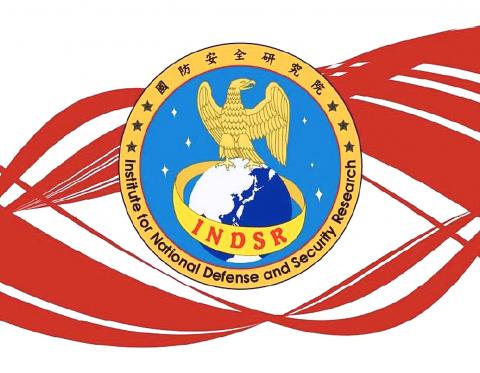China is using local “agents” and intermediary organizations as a front in its cyberwarfare efforts against Taiwan, the Institute for National Defense and Security Research said in an article.
The report, carried by the Ministry of National Defense-affiliated think tank’s monthly gazette and authored by assistant researcher Wu Chun-te (吳俊德), compared Russia’s and China’s cyberwarfare tactics.
As opposed to Russia, which has spent an inordinate amount of time and resources to regain the US’ trust, China has no such problems and can utilize contacts cultivated by its long-running “united front” rhetoric and infiltration efforts, Wu said.

Photo: Tu Chu-min, Taipei Times
Such efforts, aimed at Taiwanese temple organizations, communities and borough and village wardens, have turned them into “Chinese agents” or intermediaries, Wu said.
Having no language barrier in Taiwan, Beijing sends “fake news” to its intermediaries, who then circulate the information on social networks, such as Facebook and the Line messaging app, he added.
These efforts come in addition to buying Taiwanese-run Facebook pages and hiring local Internet celebrities to launch disinformation campaigns, he said.
Separately, National Taiwan University Department of Criminology assistant professor Shen Pao-yang (沈伯陽) said he has discovered that most online information management companies that run social media accounts are receiving “layered” subcontracts from China.
Most of the orders are subcontracts of subcontracts going up three or four layers and it is difficult to find the source without inquiries, Shen said.
However, most companies make private inquiries, as the intermediaries usually know whether the order came from Chinese sources, Shen added.
The companies are small, usually employing up to six people who work at the firms in addition to their regular jobs, Shen said.
Each firm handles many online fan pages and posts information gleaned from content farms or other fan pages, he said, adding that these groups are most prone to spreading “fake news.”
An analysis has found that the companies are mostly indirectly hired by the Chinese United Front Work Department and, occasionally, China’s Taiwan Affairs Office, Shen said.
There is no definitive proof that the Chinese People’s Liberation Army (PLA) is involved, Shen said.
The Mainland Affairs Council yesterday reiterated that any contact with the Chinese Communist Party, the Chinese government, the PLA, private Chinese organizations or individuals regarding political affairs contravenes the Act Governing Relations Between the People of the Taiwan Area and the Mainland Area (台灣地區與大陸地區人民關係條例).
Offenders could be fined NT$100,000 to NT$500,000 and they could be fined repeatedly, the council said.

SECURITY: As China is ‘reshaping’ Hong Kong’s population, Taiwan must raise the eligibility threshold for applications from Hong Kongers, Chiu Chui-cheng said When Hong Kong and Macau citizens apply for residency in Taiwan, it would be under a new category that includes a “national security observation period,” Mainland Affairs Council (MAC) Minister Chiu Chui-cheng (邱垂正) said yesterday. President William Lai (賴清德) on March 13 announced 17 strategies to counter China’s aggression toward Taiwan, including incorporating national security considerations into the review process for residency applications from Hong Kong and Macau citizens. The situation in Hong Kong is constantly changing, Chiu said to media yesterday on the sidelines of the Taipei Technology Run hosted by the Taipei Neihu Technology Park Development Association. With

A US Marine Corps regiment equipped with Naval Strike Missiles (NSM) is set to participate in the upcoming Balikatan 25 exercise in the Luzon Strait, marking the system’s first-ever deployment in the Philippines. US and Philippine officials have separately confirmed that the Navy Marine Expeditionary Ship Interdiction System (NMESIS) — the mobile launch platform for the Naval Strike Missile — would take part in the joint exercise. The missiles are being deployed to “a strategic first island chain chokepoint” in the waters between Taiwan proper and the Philippines, US-based Naval News reported. “The Luzon Strait and Bashi Channel represent a critical access

‘FORM OF PROTEST’: The German Institute Taipei said it was ‘shocked’ to see Nazi symbolism used in connection with political aims as it condemned the incident Sung Chien-liang (宋建樑), who led efforts to recall Democratic Progressive Party (DPP) Legislator Lee Kun-cheng (李坤城), was released on bail of NT$80,000 yesterday amid an outcry over a Nazi armband he wore to questioning the night before. Sung arrived at the New Taipei City District Prosecutors’ Office for questioning in a recall petition forgery case on Tuesday night wearing a red armband bearing a swastika, carrying a copy of Adolf Hitler’s Mein Kampf and giving a Nazi salute. Sung left the building at 1:15am without the armband and apparently covering the book with a coat. This is a serious international scandal and Chinese

COUNTERINTELLIGENCE TRAINING: The ministry said 87.5 percent of the apprehended Chinese agents were reported by service members they tried to lure into becoming spies Taiwanese organized crime, illegal money lenders, temples and civic groups are complicit in Beijing’s infiltration of the armed forces, the Ministry of National Defense (MND) said in a report yesterday. Retired service members who had been turned to Beijing’s cause mainly relied on those channels to infiltrate the Taiwanese military, according to the report to be submitted to lawmakers ahead of tomorrow’s hearing on Chinese espionage in the military. Chinese intelligence typically used blackmail, Internet-based communications, bribery or debts to loan sharks to leverage active service personnel to do its bidding, it said. China’s main goals are to collect intelligence, and develop a